Nearly two decades after the groundbreaking success of *Bend It Like Beckham*, director Gurinder Chadha is setting the stage for a remarkable cinematic revival that promises to rekindle both the film’s legacy and the cultural conversations surrounding women’s sports. In an exclusive revelation, Chadha confirms that she’s actively developing a sequel that aims not just to revisit familiar characters but to propel the story into a new era of empowerment and visibility for women’s football globally. This is a calculated move that underscores her belief in the ongoing importance of underrepresented narratives, especially as women’s sports continue their world-changing surge.
The excitement surrounding this project is palpable. Chadha emphasizes that she’s committed to crafting a compelling script, one that respects the original film’s charm while expanding its scope. The core intention is clear: bring the beloved characters back with meaningful story arcs that reflect their growth and struggles, resonating with contemporary audiences who have witnessed women’s football transform into a powerhouse of social and cultural influence. Her optimistic view hints at a collective eagerness among the original cast members to participate, provided the script aligns with their expectations, which reveals her respect for authenticity and the creative process.
Yet, the development is not just about nostalgia; it’s a calculated response to the seismic shifts within women’s sports. Chadha’s inspiration was reignited by this evolution—by the increased visibility, professionalism, and passion that now characterize women’s football around the world. The story she’s gestated recently aims to encapsulate that energy, making it not only a nostalgic callback but a contemporary testament to how far the sport and its players have come. It’s a bid to elevate the narrative beyond the fictional into the real, leveraging her platform to inspire future generations of women athletes.
From Rejection to Reverence: The Power of Determined Storytelling
Chadha’s odyssey in filmmaking and storytelling exemplifies resilience. When *Bend It Like Beckham* was first released, the industry’s reception was tepid at best. The idea of a film centered on young women playing soccer was met with skepticism, ridicules, and even outright condescension from some quarters. Chadha faced industry disinterest and societal biases that questioned whether there was a market for such a story. Undeterred, she persisted, channeling her passion into a piece that ultimately broke barriers and became a cultural touchstone.
Her refusal to accept the odds epitomizes a larger narrative about the importance of authentic voices in storytelling. The film was not just an entertainment piece; it became a movement that challenged stereotypes and championed diversity. The message that girls can break societal expectations and pursue their dreams—embodied in the character of Jess—remains as relevant today as it was then. Chadha’s resolve to revisit and expand this story indicates her belief that such narratives have the power to continue inspiring societal change. It also affirms her role as a filmmaker committed to more than just entertainment—she’s a catalyst for social conversations about gender, culture, and sports.
The evolution of women’s football is front and center in her renewed enthusiasm. The sport’s current landscape—more competitive, more international, and more influential—serves as an ideal backdrop for a sequel that aims to mirror these societal shifts. The film’s potential to push the boundaries of representation and to inspire grassroots movements points to her understanding of storytelling’s capacity to shape identity and challenge outdated perceptions.
Synergy of Talent and Vision: Collaborations that Drive Change
Chadha’s engagement with prominent figures like Emma Hayes and the support from policymakers underline her strategic approach to making this sequel more than just a film—it’s a cultural intervention. Emma Hayes’ involvement, offering insights from her experience coaching top-tier women’s teams, injects authenticity and contemporary relevance into the project. Their collaboration signifies a blending of cinematic storytelling with real-world expertise, promising a narrative that is both compelling and grounded in genuine sports dynamics.
Similarly, support from political figures like Lisa Nandy reflects the broader social significance of the project. Nandy’s praise positions the film as part of a larger narrative about Britain’s diversity, resilience, and aspirations. It underscores the importance of storytelling in shaping national identity—highlighting how Chadha’s work transcends entertainment to embody a reflection of societal values.
Chadha’s creative process seems guided by a vision that champions honest, joyous portrayals of women’s sports. She aims to craft a sequel that balances emotional depth with light-heartedness—capturing the thrill of competition and the joy of achieving dreams. This approach not only honors the spirit of the original but seeks to amplify its message, inspiring viewers to see women’s football as a source of pride, unity, and cultural strength.
Reimagining the Future: A Legacy in the Making
What makes Chadha’s upcoming project compelling is her willingness to imagine a future for women’s football that is ambitious yet accessible. The planned release around the 25th anniversary of *Bend It Like Beckham* in 2027 aligns perfectly with a broader cultural reckoning: the sport’s rise to global prominence and societal legitimacy. Her timing demonstrates an acute awareness of the narrative arc from underdog story to world-class competition—a journey she wants her film to honor.
In some respects, Chadha views this sequel as her final chapter in a personal and professional mission to elevate women’s stories. She acknowledges that disparities and stereotypes still linger, but her determination to tell a “hard-hitting, joyous” story signifies a belief in the transformative power of cinema. It’s about more than just entertainment—it’s about cementing a legacy that keeps pushing boundaries and inspiring change for years to come.
Her affirmation that this new installment will reflect the energy, diversity, and resilience that made the original film a cultural landmark highlights her conviction that storytelling should serve as a mirror for societal progress. She’s not simply banking on nostalgia but is actively shaping a narrative that empowers women, celebrates diversity, and champions the transformative power of sport and film alike.
